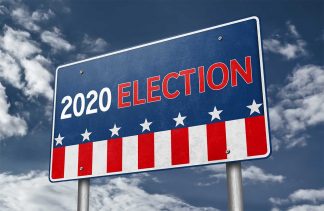By Laurie Jedamus
Libraries Civic Engagement Committee
 Election judges are responsible for the administration of election procedures in the voting place on Election Day. They are trained to handle all aspects of voting at the polling place to help make sure every American can exercise one of their most fundamental rights — the right to vote.
Election judges are responsible for the administration of election procedures in the voting place on Election Day. They are trained to handle all aspects of voting at the polling place to help make sure every American can exercise one of their most fundamental rights — the right to vote.
Election judges are responsible for the integrity of the election process. They conduct themselves and serve the voters in a manner that maintains public trust and confidence in honest and impartial elections. They help ensure that elections are administered in a fair and accessible manner, that every person qualified to vote is permitted to vote, and that only those who are qualified to vote are allowed to vote.
Election workers are essential to ensuring that elections are a success. On Election Day, there can be as many as 30,000 election judges temporarily employed at polling places across Minnesota. You too can be an election judge — many towns and cities in Minnesota are looking for qualified applicants for the primary election in August and the general election in November.
Why should I be an election judge?
- Serving as an election judge is a chance to learn about elections, meet your neighbors, and is a great service to your community.
- It pays to be an election judge! Wages vary by city, but generally range from around $11/hour to $17/hour. Many employers, including the University of Minnesota, allow employees to use paid leave to work as election judges.
- Election judging also looks good on a resume!
Who can apply?
- You must be eligible to vote in Minnesota and able to read, write, and speak English.
- There are restrictions on having relatives serve as election judges in the same polling place.
- Candidates cannot serve in a precinct where they are on the ballot. In addition, relatives of a candidate, and anyone who temporarily or permanently lives in the same house as a candidate, cannot serve in the precinct where the candidate is on the ballot.
What do election judges do?
Election judges are temporary employees of local election officials who help their neighbors cast ballots. They are committed to making sure an election is conducted in a fair, accurate, and impartial manner.
There are many responsibilities and an assortment of tasks to perform on Election Day. In general, election judges:
- are responsible for all election materials
- make sure that all election laws are followed
- ensure that only qualified voters are permitted to vote
- perform various checks to help ensure accuracy
- ensure voter privacy
- certify the precinct election results
Specific duties include:
- setting up and breaking down a polling place before and after voting hours
- opening the polling place at 7 a.m. and closing it at 8 p.m.
- signing in registered voters
- verifying voter qualifications and registering new voters
- explaining voting procedure and use of voting equipment to voters, providing ballots, and monitoring the conduct of the election
- processing and transmitting votes when polls close
- certifying vote totals
All these steps are needed to make sure voters can cast their ballots easily, safely, and fairly on Election Day.
When do election judges work?
- Election judges are the first people to get to a polling place and the last people to leave. A typical schedule on Election Day is from 6 a.m. to around 9 p.m. In some cases, you can ask to work a half-day.
- Election judges are expected to attend 2-3 hours of paid training and work a shift on at least one Election Day — the primary election on August 11 and/or the general election on November 3, 2020.
- Some locations also need election judges to work during early voting, the week before Election Day.
Cities and counties are taking many additional precautions to ensure that election volunteers and voters are safe during in-person voting. Social distancing, mask-wearing, and curbside voting on Election Day will all be encouraged and/or required.
How can I apply?
Contact your city or county election office using the information on the MN Secretary of State’s election judge page.




